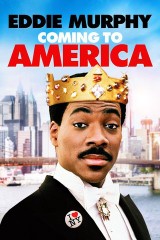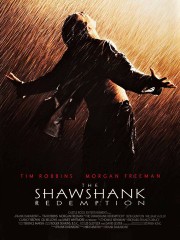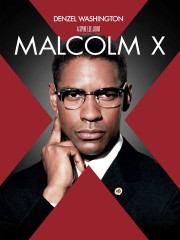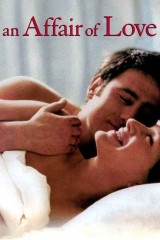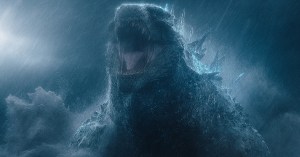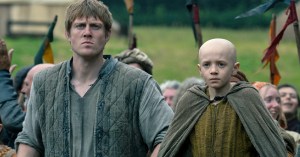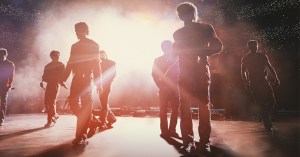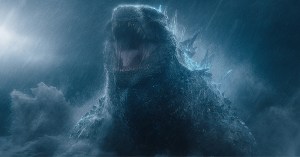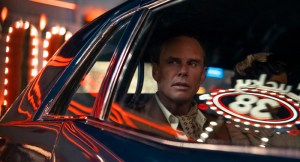Omari Hardwick’s Five Favorite Films
The star of TV's Power, Sorry to Bother You, and the ambitious A Boy. A Girl. A Dream. loves Mean Girls and the classic Clash of the Titans.

(Photo by Steven Ferdman/Getty Images)
If you’re caught up on Starz’ hit series Power, you’re already well acquainted with Omari Hardwick, the Georgia-born actor who stars in the 50 Cent-produced crime drama as Ghost, a drug dealer looking to go straight. If you don’t watch the show, you may still know Hardwick from any of his appearances on series like Saved and Dark Blue or in movies like Kick-Ass, For Colored Girls, or Boots Riley’s acclaimed debut Sorry to Bother You earlier this year.
Currently, Hardwick stars alongside longtime friend Meagan Good in a romantic drama called A Boy. A Girl. A Dream., about a man and woman who meet and begin to fall for each other on the night of the 2016 presidential election in Los Angeles. Like Alejandro González Iñárritu’s Oscar-winning Birdman, the ambitious film is presented in real time, shot in a single take as the two stars make their way from party to party over the course of the evening.
Hardwick spoke to Rotten Tomatoes about his Five Favorite Films, noting that, “These movies I’m giving you, I came up with them knowing that what I have an affinity for presently — I’m 40 years old — I equally had at eight years old.” With that in mind, he found it difficult to narrow them down to just five, so read on for Omari Hardwick’s Seven Favorite Films.
Ryan Fujitani for Rotten Tomatoes: One of the defining aspects of A Boy. A Girl. A Dream. is that it takes place in real time, and it’s presented all in a Birdman-style single take. How difficult was that?
Omari Hardwick: It was definitely a challenge. It required a level of trust in my fellow actor, specifically Meagan Good, who did an incredible job, but we were aided in the reality of having known each other for 20 years.
When I got cut from the NFL, I did New York first, in terms of theater, crazy grimy theaters, never Broadway, off-Broadway, hole-in-the-wall theaters, and made it to L.A. pre-9/11. I found poetry venues immediately, being a writer. So, the movie definitely was aided by having a relationship that I had developed with her as far back as finding those poetry venues in L.A. Ironically, she was a 16-year-old actress who was really rocking it — she had come off of Eve’s Bayou or what have you, and we got close. But we’ve known each other for so long.
And I would say, you know, she and Curtis, at one point, dated, Curtis being 50 Cent. He and I actually spoke about me and her working together, and how proud I was of her. I never thought that Meagan got enough, perhaps, credence for how intelligent she is, how expansive I believe her to be, but I think the window is not always as opportune for a brown, female actress to succeed, if that makes sense to you.
So, it was a challenge, but it was also one of those things where, as a big brother, perhaps, I took on the backpack to carry the ad-libbing. Let me do what I can at this stature that I’m now blessed to have, obviously being a poet and stage actor, I can use my ability to improv and ad-lib. But more importantly, with her being cast to play it, let me try to work as hard as I can to make her see it in a different light.
It was hard. It was definitely difficult. It was 60 pages, loosely, of us knowing the script, and then it was about 30 pages where they let us riff, and that’s a lot.
RT: That’s a lot of room for improvisation.
Hardwick: There was a lot of room. You know, the other actors… Dijon Talton I had worked with on I Will Follow, the first film of Ava DuVernay, and of course, she was Ava DuVernay. I did two movies with her. I did a movie called Middle of Nowhere, but I did a movie first called I Will Follow, and that was the guy who played the nephew of Salli Richardson, and his name is Dijon Talton. He plays the Uber driver [in A Boy. A Girl. A Dream.], so there was a relationship between us that aided. Jay Ellis and I had a lot of room to improv and riff, being that we were both promoters of a club and trying to figure that whole thing out. Obviously, you’re watching this in real time, as you said, as these two fall in love the night that Donald Trump wins, so again, the prior relationship that I had with Meagan helped a lot. And Qasim [Basir], the director, I know as well.
So, those things are cheat sheets, of a sort. You’ve got CliffsNotes when you’ve got all of those people knowing each other, and I don’t really know if the same challenges would have been there, had we not known each other. That might have been a lot harder.
RT: You just touched upon this, but obviously there is some politics baked into the background of this story, but let’s start with the confrontation with the police that happens in the film. That scene serves the story, providing a way for your character and Meagan’s character to reconcile after their misunderstanding. But considering all the media attention surrounding police brutality lately, how did you feel personally about performing that scene? Is that too personal or political a question to ask?
Hardwick: No, I think it’s a good question, and the reason I think it’s a good question is because, you as a journalist, no matter what race you are or gender, you can never know who you’re really talking to, but if you weren’t born yesterday — or, if you were born yesterday, if you at least stayed up all night — most people would imagine that at some point, an actor of the age range of an Omari Hardwick, who is an African-American male in this society, has definitely had his hand in that actual experience. We can relate to the fate of the Freddie Grays, the Michael Browns, the Trayvon Martins. It’s one of those things we’ve been through. We’re not that far from the reality of a lot of things, but as a country, we try to brush it under the carpet, is my point.
I don’t think you could ever talk to any African-American actor who’s in the position that I’m in — or even as young as a Michael B. Jordan, who’s a likable brother but younger than me, or a Jay Ellis, or Dijon Talton, or John David Washington, Denzel’s son — you could never speak to these people and not expect that we, at some point, have all experienced the things that Cass did in the film A Boy. A Girl. A Dream. I have definitely had seven to nine knees in my back, those knees being attached to five to seven different cops, of all races and gender, and an Asian cop running in, throwing a flashlight on my face and going, “Pick him up. He’s six shades lighter than the suspect.”
That’s a real story. I was 23 years old and 200 pounds, fresh off the football field, so not yet New York theater. That’s fresh off the football field, living in a $350 apartment that I eventually left pretty soon after. But that night, the milk exploded on the ground as I had just returned from the store — probably living on cereal. The freaking extension cord that I bought from the local Home Depot, because the chick I was dating was super cool and hooked me up with a TV in downtown L.A. — just a little visual for you — and then, it took just a nanosecond of walking down the street, probably literally whistling, minding my own, you know, because I fit the description of a murder suspect.
So it’s not a political question when you’re talking to people, I would imagine, my age, who are African-American, because we probably have been through it. It is what it is. You kind of play those scenes out. You don’t necessarily think about how personal it is to you, but… You know how the saying goes, “All we ever needed to know, we learned in kindergarten?” I would imagine that all we ever really needed to know about how to react to hate, that comes from that of racism. A lot of brown kids have known by a little after kindergarten, if you think about it. It’s there. So that one ain’t as hard to play for me, brother.
RT: Thanks for being open about all that; I appreciate that. Lastly, touching again on the politics in the movie, even with all of that happening in the background, there is a bit of a romance going on, but it’s more about the hopefulness, I think, that your characters are able to hold on to. With that in mind, what would you like viewers to take away most from this movie, which is a technical achievement, an acting achievement, and a statement of politics?
Hardwick: I think that’s a well set-up question. I think that the prior answer to the prior question perhaps is the best segue into that. Adding to what I said before, we live in two different Americas. We really do. We don’t talk about it enough.
Not to become political, but whether you agree with what [Colin] Kaepernick stands for or not, or whether you think it’s motivated by different intentions, the reality is, he’s not off in stating that he wants the country better. I don’t think that a biracial kid who was adopted by white people wants the country to not be better, in terms of forward progress, right?
So, I think with the movie, Qasim and producer Datari Turner — and I gotta give a shout-out to Steve Holleran, our DP, who was able to do all that camera stuff in one take, who is a red-headed white American — we are all in this huddle together, all looking different, obviously the gender of Meagan being different. The reality was, we all believed that there’s an unspoken truth, where we didn’t need to say it verbally, but telepathically we could communicate, as higher thinking beings who happen to be gifted, that A) there are two different Americas, and B) all human beings want a hug, right? Everybody wants a hug. Ultimately, after that, everyone has a dream, even if it’s demented, in terms of how the dream is influenced. Everyone dreams.
I think the best way to answer your question is, how do dreams smell and look, as they pertain to brown people in a country that seems divided in two? Does that mean that if a Ryan Gosling or Leo DiCaprio are playing Cass, and Meagan’s character is played by Rachel McAdams, it looks any different? No. The Notebook was one of the greatest love stories of our time. Our generation goes crazy about it. Diana Ross’ and our boy Billie Dee Williams’ Mahogany, right? Or Lady Sings the Blues. But truly, the blues you’re seeing a little bit, when you are brown, is that you’re still trying to have someone corroborate or justify or validate your dream, whether it be a first grade teacher believing that you can be what you’ve raised your hand and said you wanted to be, or protecting it. Like, Oprah Winfrey, she often brings to the forefront a white teacher — that first grade teacher believed in Oprah. That woman doesn’t look like Oprah.
It doesn’t matter the color of the person who believes in your dreams, but it does matter with the way America is, in terms of how that plays out that dream. So Donald Trump as a backdrop, or him winning the election, with this sort of thematic mantra that he lives his life with, is not befitting of these two guys in the movie that me and Meagan’s characters encounter. Then there’s other people that validate and justify what we feel in the characters. Even a cameo by Kenya Barris, right? In reality, without making it a race issue, we always try to make it a Trump issue, which is, just simply recognize that everyone wants a hug, everybody dreams, who wouldn’t root for somebody dreaming? And at the end of it, the political backdrop sort of speaks to the fact that, how is that dream, in terms of it being executed, and how does that look, if you don’t necessarily look like those that are able to get the American Pie, typically. It doesn’t mean we can’t get it, but the operative word is “typically,” because it doesn’t look the same for brown folks. Maybe this was always America. Who knows, right? You tell me what the painting is or what it used to be. Maybe it’s the same as it’s always been.
A Boy. A Girl. A Dream. opened in limited release on Friday, September 14. It’s also available to stream here.




